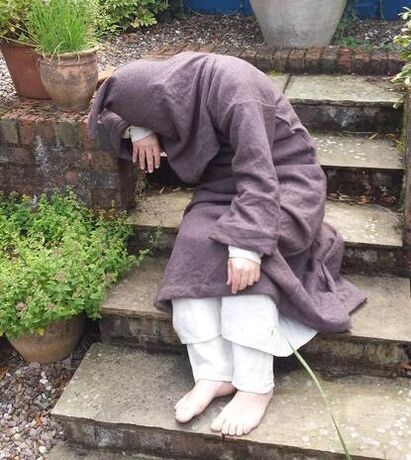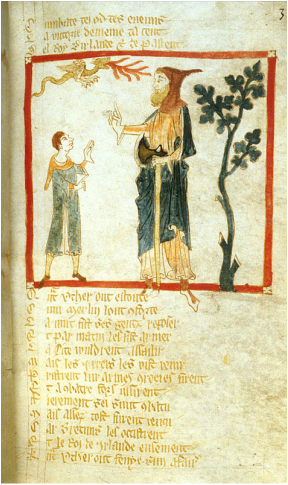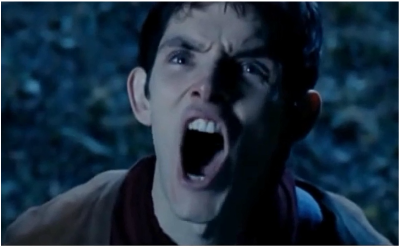The Anglo-Saxon Monk meets a Master of Merlin, Ivana Radman, who lets us into a few secrets about Colin Morgan's dragon speak ...
ASM How did you arrive at the decision to write a Masters thesis on Merlin and Old English?
IR Merlin happened to be running on TV at about the same time I was taking a class in the History of English. The spells, and the show itself, immediately caught my attention, and having picked up a few Old English words, I put two and two together. As for the thesis, my friends were cheering for something Merlinesque and since I wanted to do something fun, I went along with it. ASM For the benefit of non-linguists, would you, in a nutshell, define Old English? IR It’s the earliest recorded stage of the English language, dating from the coming of the Anglo-Saxons in the fifth century up to the Norman conquest in 1066, and beyond into the twelfth century. As it was governed by a complex set of grammar rules (inflections for case, number, gender, person, tense, etc.), its syntax (word order) was more loose. Also, the vocabulary appears more Germanic and much more homogenous than today, with only 3% of borrowings, mostly from Latin and Scandinavian languages. The question is, of course, what did Old English sound like? No one can really know for sure. Experts make informative guesses based on poetic evidence, comparative reconstruction and alphabetical logic. ASM Can we just clarify one point: Was it just Old English that was used in Merlin or were other languages used for spells too? IR Jones [one of the BBC Merlin team] explains in one interview that they decided on another language for those epic scenes with Kilgharrah [the dragon in the show], starting at the end of season two. And according to Merlin Wiki, Old Irish was used too, for the sidhe magic, though I don’t think the audience can really hear the distinctions between the spells in Old Irish and those in Old English. This is where the transcripts come in handy. According to Merlin Wiki and my own count, there were 306 spells, 277 of them in Old English. Sixteen were instances of ‘dragonspeak’, whereas 13 were in Old Irish. ASM You mention in your thesis other modern adaptations of Arthurian stories, and how most of these have presented the language of Arthurian Britain as ‘antiquated and stylized’. In your opinion, has the Merlin team differed from this in its own approach to language, and if so, how has it differed? IR I don’t think there have been many adaptations similar to Merlin, in terms of venturing into translations and not relying on stylistic devices (only) in rendering the language ‘older’. And the fact that the show went on for five seasons made it possible to produce such a large number of spells. In comparison, Boorman’s movie Excalibur features a single spell in Old Irish. Not much has been written about Merlin – yet! I’ve barely found two articles, and these only touch upon the subject of language. But linguistics aside, plenty can be said, don’t you think? Just look at the philosophy behind the Old Religion, or socio-political and cultural issues, or even the fashion in the show. I think fans would like to read about those things. ASM You briefly mention in your thesis that the decision to use Old English for Merlin’s spells – the language of the Anglo-Saxons, and hence a younger language in Britain than the celtic ones or, indeed, Latin – 'violates the show’s own narrative logic' (quoting Manea). Can you explain a little more about this? IR Well, official history has it that first there were these Paleolithic and Neolithic inhabitants. Then came the Celts and afterwards the Romans. Old English arrived with the Anglo-Saxons, whom Arthur is fighting in the show. Yet, Old English is [presented as] the language of the Old Religion, which seems to have been inspired by pre-Christian mythologies. ASM Do you think it matters whether or not the spells in Merlin are based on real languages? IR Oh, I think absolutely not. The magic of the spells comes from their being unintelligible, though I’m guessing it did not sound as strange to the English audience as it perhaps did to the Croatian one. Keeping it ‘English’ with Old English was beautiful, if you ask me. But I think any other ‘mysterious’ language, even an entirely fictional one, would’ve worked as well. ASM Can you explain your methodology? How, for example, did you go about deciphering the spells? I’ve found this very difficult to do myself – we monks don’t get much time for magic – and as you know I demonstrated, rather pathetically, my confusion about the ‘dragonspeak’ in one of my earlier blog posts. [You've not read it, beloved ones?] IR Uh, it took a lot of nerves. I first obtained the spells in Old English and the translation from the Merlin Wiki (it’s amazing what fans can do!) and went through all the episodes – you can never see them too many times! [She laughs out loud]. Then I analysed each sentence with the help of various dictionaries and grammar books. And I also googled A LOT. I found that in addition to borrowing from Beowulf and The Ruin (Wiki), a line or two might have been adapted from another work of Old English literature, The Dream of the Rood. I haven’t researched ‘dragonspeak’ thoroughly because it’s supposedly ‘Homeric Greek’, and my paper was limited to Old English only, but not much can be found. As for the noun itself (referring to your dragon post), I know about wyrm too, but I’ve also come across the noun draca to mean ‘dragon, sea-monster, serpent’, with dracan as its genitive case. [There! She mentioned the earlier post.] ASM Now, it would seem from your thesis that you are suggesting Merlin needed a few grammar lessons! Would you explain briefly the problems you identified? IR I hope I didn’t make it sound like that! I was going for a descriptive, not a prescriptive approach. I simply compared the Wiki material to what could be found in Old English grammars and dictionaries. What I observed was that words were more often than not uninflected for case, gender and number, and that almost half of the spells contained a single noun in the nominative case or a verb in its infinitive or imperative form (a lot of ‘fire,’ indeed). [The mention of fire, here, is a reference to the earlier post – please read it, beloved ones.] And when you think about it, yes, morphology [i.e. the study of word forms, including inflections] is the very heart of Old English. But that in no way undermines the beauty or the importance of the spells for the show. And I’m guessing Dr Faulkner’s work differs from the Wiki material. [Dr Faulkner was interviewed in the earlier post – yes, please read it - now!] ASM You mentioned to me, in your comment for the earlier post, how you wished you’d known about the linguist Dr Mark Faulkner’s work as translator for Merlin before you wrote your thesis. Why was that? IR Well, if I had known that the producers wanted Old English to sound ‘strange’ and ‘alien,’ as Dr Faulkner put it, then I would’ve researched how they accomplished ‘intentional mystery’. Because they never stated what exactly they wanted to do with the language – closely follow the rules or make it their own, or something in between – I could only make a wild guess based on my analysis. And it would’ve explained the pronunciation, too. ASM You raise a question at the outset of your thesis: ‘Do Old English words acquire new meaning?’ How would you answer that? IR I think it’s always interesting to see what happens to words throughout time, how they’re adapted to fit new contexts. And even more exciting is the inventiveness behind creating new ones, such as compounds. In Merlin you have coinages like sawolduru – translated as ‘spirit-gate,’ from Old English sawol (‘soul’) and duru (‘door, opening’). This seemed to be modelled on Old English kennings, for which the language is famous: for instance, banhus, literally ‘bone-house’, meaning ‘body’. And even entire phrases were put together from existing words, like In sibbe gerest(e) (‘Rest in peace’). ASM Do adaptations of Arthurian stuff and Old English continue to interest you? In other words, what are you doing now? IR I like all things language [she smiles a big smile] and Arthurian stories have always been an interest of mine. But right now I’m not doing anything related to that; I’m preparing for an exam in philosophy and learning Portuguese. ASM Finally, my most important question till last: Are you a Colin Morgan fan? IR Haha, I think his acting was brilliant, especially his bromance with Arthur. A friend of mine and I researched YouTube comments on this topic for one of our papers. And if you take a look at fan fiction, it’s all about Merthur, once-and-future-ship [she winks at me]. Fiat . Fiat . Amen . Well, there you have it! What a fabulous interviewee, my beloved ones. Mind you, she didn’t explain to me what a bromance was. I just got a wink. I don’t even know what that means ... If you have anything you want to say about this post, you know what to do ...
0 Comments
Your comment will be posted after it is approved.
Leave a Reply. |
Details
|




